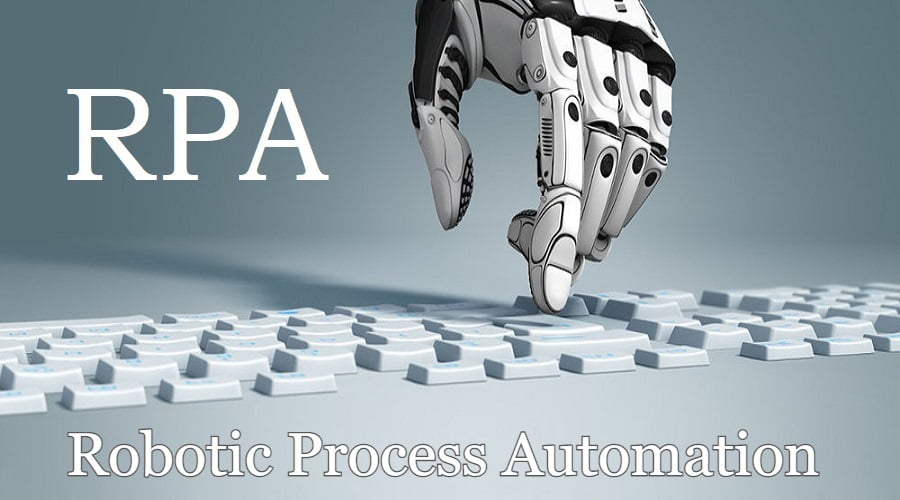There are several applications of robotic process automation, but here, we are listing 10 amazing examples of RPA use cases that are being leveraged by the companies.

How Do Companies Use Robotic Process Automation? 10 Examples of RPA Use Cases
Robotic process automation or RPA technology is gaining popularity in the corporate world over the past two years. Future business strategies will undoubtedly undergo RPA or robotic automation.
Robotic process automation, although a relatively new technology, has gradually become an innovative trend to become an undeniable reality.
RPA technology helps automate certain internal business processes, increase efficiency and productivity and free up corporate workers so they can focus on higher-value work.
Many companies are using RPA technology to automate every step of data validation associated with a customer profile and integrate the necessary data sets, introduce accuracy in their operations and make monotonous processes error-free, eliminating the need for a human factor to switch between applications.
The very nature of the markets, the changing business fabric, and the rise of new technologies have led to business processes with a large volume of information, technical and analytical tasks. This new scenario is especially suitable for robotic automation processes, having enormous potential to eliminate the most repetitive and time-consuming manual processes in the daily work routine.
Therefore, RPA technology in the business environment constitutes a natural resource to optimize the performance of companies, moving away from the qualifier of the tendency to essential.
Employers are always looking for ways to improve, both the well-being of their employees with measures such as flexible compensation, as well as in the automation of processes. The idea of a software robot or machines capable of mimicking human behavior navigating business software such as ERP systems or any kind of service management tools is really appealing, beneficial, and rewarding.
Do you want to know more about the applications of robotic process automation? Let’s see some real-world examples of RPA technology and the advantages it brings in relation to performance and productivity.
Read here: 10 Benefits of Robotic Process Automation in Business
10 Amazing Examples of Robotic Process Automation in Business
There are many examples of RPA use cases automating tasks in different business departments. In all probability, you will already know the many advantages that RPA technology brings. Therefore, we are going to focus on offering you a little more light on the tasks or situations in which this technology is a great competitive advantage.
Check out 10 amazing examples of RPA use cases that are being leveraged by the top companies.
1. Payroll Administration
Robotic process automation is reshaping today’s payroll administration services. RPA can be implemented in payroll as part of a function or enterprise-wide automation initiative.
All the processes related to the control and management of payroll including all kinds of legal and administrative requirements become a more attractive task thanks to robotic process automation. RPA technology helps collect, control and manage the factors of all this context and connect it in an optimal way.
2. Data Migration
RPA technology can cut the migration time and costs, reduce human intervention and consequently human error and integrate data from multiple systems.
Legacy billing systems must interact with other systems and need to obtain some relevant data. Typically, they are tasks that are developed by hand with a large percentage of human error. With RPA technology manual work is eliminated and potential administrative errors can be avoided. It also allows the updating of data and integration of different applications.
3. Preparation and Submission of Reports
For any company, the preparation and submission of reports is a vital function, but preparing and submitting such reports requires a skilled and experienced workforce. However, RPA technology can accurately do this work in less time. RPA bots can be placed in charge of collecting data, preparing reports, and even submitting these reports.
More and more often, companies require periodic reports to have real, up-to-date information and to undertake the best possible decision-making. RPA solutions can easily generate reports, analyze their content, and, based on them, send them to interested parties.
4. Customer Relationship Management
Customer relationship and contact tasks depend on several different systems, which can affect the final experience, adding a large volume of simple repetitive tasks.
RPA technology automates repetitive and rule-based tasks to trigger, run, and error-check against critical business applications. It can help in better case management of customer service requests, and work orders in the CRM.
This is the ideal scenario to configure a robotic automation system to process different areas with the greatest speed and immediacy possible, increasing customer satisfaction.
5. Recruitment and Hiring
HR departments around the world are adopting robotic process automation as RPA technology frees a department from its repetitive and redundant tasks, so they can focus on more strategic initiatives.
Human resource management includes various functions and tasks in the recruitment process. RPA software can be deployed relatively quickly and efficiently to bring speed and transparency to the entire recruitment and hiring process.
RPA technology can make HR and recruitment functions more efficient, save time, help reduce bias in the hiring process. Organizations must be aware of how to successfully implement RPA technology in their existing systems.
6. Order Processing
RPA technology provides a lot of benefits by automating order processing and fixing all the difficulties and loopholes in the order processing industry with the help of various software technologies.
Another functional area that involves a good number of tasks, daily and repetitive processes: addresses, entering data, invoices, shipping labels, or control and management of warehouse inventory. Robotic process automation could develop these functions naturally and with 0% errors.
7. Expense Management
It is true that there is a great alternative of software options to do expense management, but RPA solutions can become much more efficient. They can do a lot more specific tasks such as, for example, the automatic data extraction of important receipts or invoices necessary for each task to be developed.
RPA technology can be implemented with existing ERP software to characterize missing receipts, error-prone spreadsheets, out-of-policy-spends, late expense submissions, etc.
8. Supply Chain Management
Robotic process automation is used in supply chain management to automate common low-value tasks, speed up supply chain operations and eliminate human error.
RPA technology allows the supply chain to scale up faster so that it can meet supply requirements as demand increases.
As with customers, supply chain management requires exhaustive control and monitoring of their performance. All tasks related to supplier knowledge, communication, and management can be organized and automated without losing efficiency.
9. IT Service Desk
The IT services of a company are essential to maintain an automated and technological control of new users. These tasks can be programmed and configured to be carried out by robotic process automation, reducing the time in this task and having more time to develop other tasks.
RPA technology improves help desk operations as it modernizes and standardizes IT help desks, automates user management, improves service delivery quality, and improves user experience.
10. Product Categorization
Integrating RPA to categorize products based on the customized product assignment rules can help give each product the appropriate taxonomy. This allows the customer to easily find these products when they search for them.
Especially in the case of retail companies, product management includes tasks as repetitive and tedious as updating the item code or reference number with the product. RPA technology can be used to automate this process, saving thousands of man-hours.
Robotic process automation tries to avoid living with a series of repetitive tasks that can be the engine of errors and failures of time and performance. Its versatile and flexible nature for any business niche, makes this technology stand out as a primary resource for business management.






Pingback: Top 10 Technology Trends You Need to Know for 2022 – SciTech Society